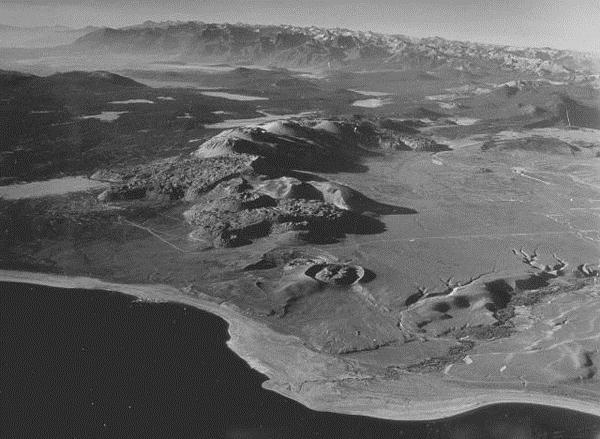To people passing through the Lee Vining area,
these volcanoes seem like sentinals guarding the Mono Basin.

These volcanoes were pushed up millions of years ago, when te
San Abdreas Fault moved through this area. A violent shift in that
fualt caused a tear to open in the earth's crust here. Magma from
the mantle pushed up and and spewed out here. The magma cooled and
formed these mountains. Eventually, the San Andreas shifted farther
west, to its current position. To early geologists that came to
this area, these volcanoes seemed like most other volcanoes in the
sierra Nevadas. But, eventually, small discreponses started to crop
up. They seemed to have exploded more violently in their initial
eruptions, they had produced a different kind of igneous rock, and
they supported a different ecosystem than the sierras. During these
volcanoes' first few eruptions, they threw pieces of magma far out
from their calderas. A few of these are visible to the southwest
from this location. In the sierras, most volcanoes there produced
basalt as their principle igneous formation; these volcanoes
produced pumice instead. Pumice is a very soft, brittle volcanic
rock that can float in water under ideal circumstances. These
volcanoes have developed their own ecosystem, the Inyo Jeffery Pine
Forest.
The Inyo Jeffery Pine Forest is one of the largest continuous
Jeffery Pine forests in the world. It is unique because of its
location in the high desert. part of the reason it can thrive here
in that the Dana Divide in te Sierra Nevadas is almost due west of
here. This allows more precipitation to reach this area from the
pacific coast. These trees also thrive because they live on rich,
pumice based soil. This contains minerals not usually found in the
soil of the high desert, which is usually alkaline.
Now to get credit for this earthcache, email me the answers to
the following question:
1. The name and GC number of this earthcache.
2. The number of people in your caching group.
3. Describe the color of the soil and compare it to desert soil
elsewhere.
4. In your opinion, how well have the Jeffery Pines done in
surviving here?
5. Are any large rocks that were possible thrown from the
volcanoes visible nearby?